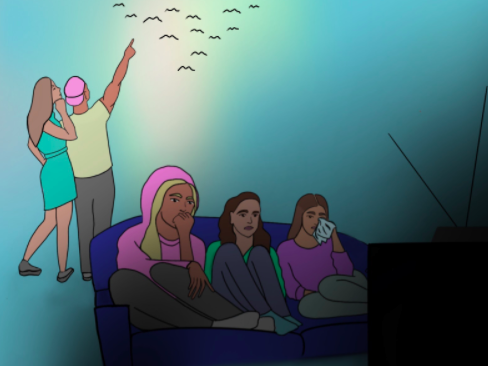The Challenges of Coping with Stress During COVID
January 27, 2021
How many times have you caught yourself wondering when the last time you stepped outside of your house was? Whether you have been cooped up due to possible exposure, or because you simply have nowhere else to go, it can start to feel lonely and stressful.
As we begin to enter month 11 of COVID in the United States -yes you read that correctly, 11-some of us may be feeling like our lives are forever changed. Back in the good old days, people used to be able to go to the gym when they began to feel stressed, or even out to a bar with all of their friends. But now, what is there to do? Finding ways that help you cope with these stressful feelings is important for both your own mental well being, and for those around you.
The CDC explains that stress causes fear and anger, changes in appetite and energy, difficulty sleeping, increased use of substances and of course, worsening of mental health conditions.
According to a study by American Psychological Association and conducted by The Harris Poll, “nearly 8 in 10 adults say the coronavirus pandemic is a significant source of stress in their lives… with more than 7 in 10 noting that in the prior weeks they felt so tired that they sat around and did nothing, felt very restless, found it hard to think properly or concentrate, felt lonely, or felt miserable or unhappy.” American Psychological Association also found out that based on this study, Gen Z was the generation with the highest rise in stress levels.
“2 in 3 Gen Z adults in college (67%) say the pandemic makes planning for their future feel impossible. Further, most Gen Z adults in college (87%) report education is a significant source of stress in their lives”, writes APA.
These numbers can seem scary, but if you have felt yourself feeling more stressed and anxious last year than you ever have before, then you can take this information as a sign that you are not alone. Luckily, it’s never too late to fix what COVID has taken away from us. Here are some ways the CDC recommends to help those with climbing stress and declining mental health.
First things first, put the technology away. It is important to stay up to date with what is going on in the world around you, but when it consumes you it begins to control you. This is especially true with this past year’s news stories. I know we all want to be aware of what is going on, but disconnecting for at least a few hours a day is extremely important for mental health. 2020 was enough to make anyone feel a little insane, so let’s try to refocus on our new and hopeful 2021.
Once the phone, tv and computer screens are out of sight and mind, you can begin to take care of your body. Physical health leads to mental wealth. Exercise daily, eat healthy, sleep as much as possible and stay away from your vices such as substances. Remember to breathe and meditate whenever possible, as well as helping clear the mind and rid of any toxins.
TCN Behavioral Health also gives 102 self-care ideas and activities to do when you don’t want to leave the comfort of your own home. Some of these fun and unique ideas include: painting your nails, taking a bubble bath, getting ready in the morning whether you have somewhere to go or not, a virtual museum tour, virtual zoo and amusement park, eat your favorite ice cream, write in a journal, sing as loud as you can and 93 other fun ideas just like these. Be creative and make the most out of what quarantine has to offer.
Lastly, connect with friends and family. Trust that there are people out there who care about you and are willing to listen. Everyone needs some time to themselves, however, don’t lose sight of those who love and support you. Stress can be scary, but you’re never alone.






